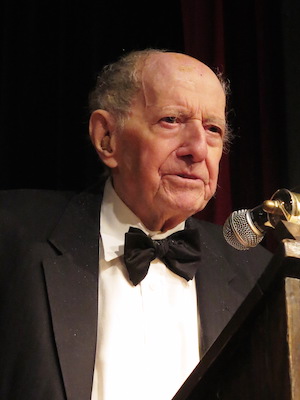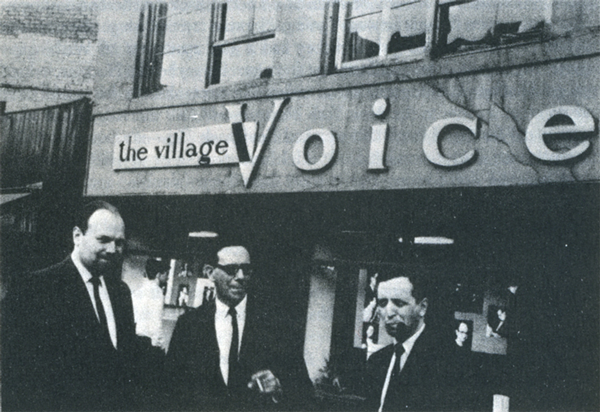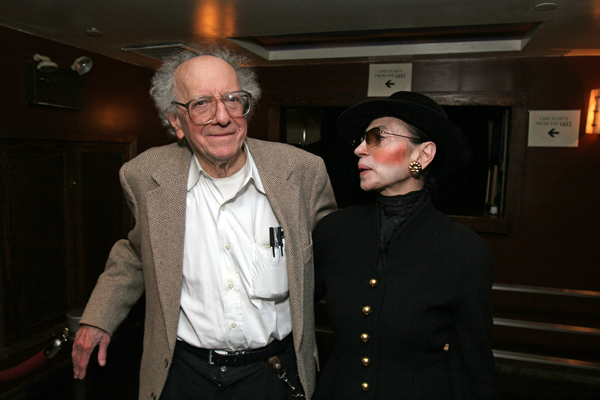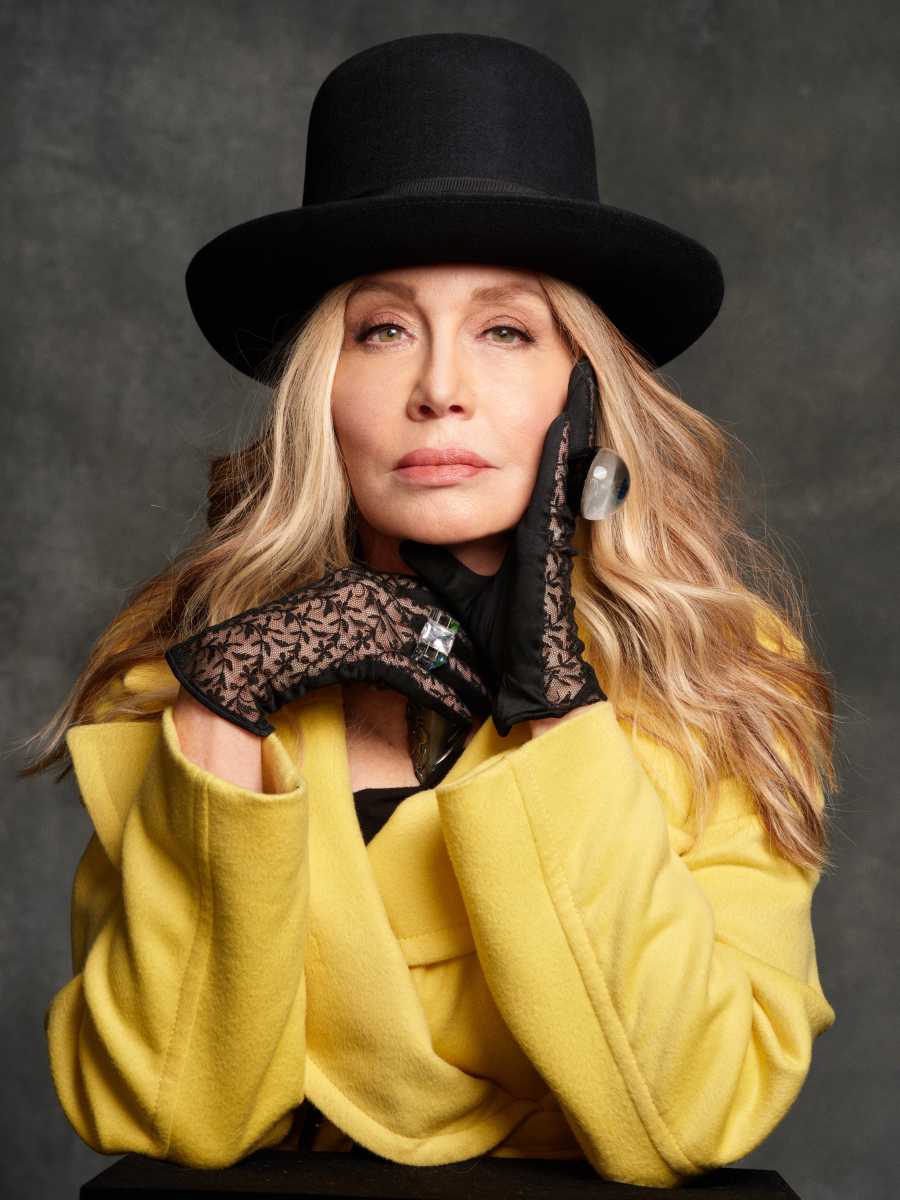
BY LINCOLN ANDERSON | An oversize presence in the world of New York journalism for six decades, Jerry Tallmer, died on Sun., Nov. 9, at the Dewitt Hospice on the Upper East Side. He would have turned 94 in December.
Tallmer was a founding editor of the Village Voice in 1955, serving as its first film and drama critic and associate editor. In later years, however, he was a regular and prolific contributor to The Villager.
He had been in and out of the Dewitt facility over the past year.
While at the Voice, Tallmer founded the Obie Awards to honor the best in Off Broadway theater. During his lengthy career, Tallmer interviewed literally everyone who was anyone in theater, as well as countless figures in film, jazz, literature, politics and even sports.
According to his daughter, Abby Tallmer, a freelance editor and writer who lives in the Village, he reviewed and publicized the first production ever of Jean Genet’s “The Blacks,” and played a pivotal role in doing the first write-ups on the work of Edward Albee and on Tom Stoppard’s work in the U.S. He also reviewed and publicized the first U.S. production of Samuel Beckett’s “Waiting for Godot,” she said.
When Stoppard first came to New York and had nowhere to stay, Tallmer arranged for him to sleep on a cot in the Voice’s office.
But after seven years at the fledgling alternative weekly, Tallmer, then a new father of twins, moved to the New York Post to make decent money.

Starting the Voice was the idea of its co-founders, Ed Fancher and Dan Wolf. Norman Mailer was an early financial backer of the paper and had a weekly column. Tallmer was quickly brought on board. He had honed his newspaper skills early on in college as an editor of The Dartmouth.
“Jerry was somebody very special,” Fancher told The Villager. “A great loss. … We followed his pieces in The Villager. We’re subscribers. … Jerry was a wonderful person. And one of the ironies was, when we started the Voice, we were in competition with The Villager — and Jerry wound up writing for The Villager.”
Tallmer and Mailer famously feuded, in large part because the bombastic Mailer would always turn in the copy for his column, “An Advertisement for Myself,” so late on deadline, and sloppily written. Mailer would then get furious if it wasn’t proofread perfectly, and blamed Tallmer.
Things came to a head when one phrase in one of his columns came out “nuisances of growth” when Mailer apparently had meant for it to read “nuances of growth.”
“Norman would come in very late with his copy,” Fancher said. “And Jerry was working 20-hour days. … Norman was crazy in those days, nutty.”
Tallmer worked such long hours that he would sometimes just abruptly plop down on the Voice’s floor and catch a much-needed nap right there.
Mailer, in a closed-door meeting, told editor Wolf and Fancher that it was either him or Tallmer — that one of them had to go. They told Mailer to take a hike.
“Mailer didn’t want to edit. He just wanted to talk about sex, drugs and jazz,” said Tallmer’s daughter.
According to her, her father always did, in fact, consider himself one of the “four founders” of the Voice.
However, Fancher said, “Whether you consider him a founder or not — I don’t give a good goddam. He was very important to us. I don’t think we could have put the paper out without him.”
In fact, Fancher said, if Tallmer had stayed at the Voice, he would have surely succeeded Wolf as the paper’s editor.

“Dan was nine years older than I was. He wasn’t well,” he said. “Once we began to make a little money, Jerry would have made a better salary.”
As for which one of them actually thought of the name the Village Voice, Fancher said no one is really sure.
Jules Feiffer, the famed cartoonist, who was discovered by Tallmer, recalled the Voice’s beginnings — and how Tallmer helped create what came to be known as New Journalism.
As they were moving ahead with the idea of starting the Voice, he said, Fancher, Wolf and Mailer “looked around for someone who knew something about putting out a paper, because Ed, Dan and Norman were intellectuals and theorists, so they didn’t know about this other stuff — like every Wednesday, your paper somehow gets on the newsstands. So they hired Jerry, who, at least, had worked on a newspaper once. And by the time I walked in the door a year later, Jerry had taught himself what he needed to know to put a paper together that didn’t read or look like any other.
“And since a cultural organ operating out of the Village must have a critic who reviews plays, Jerry took on that job, as well. And in no time, in a voice and style that was not lofty, not all-knowing, not out to prove how superior the critic was to the play under review, Jerry introduced openness to theater criticism. … He helped invent the kind of voice that, within a few years, almost everyone was trying out in one form or another. Talking to the reader as if he’s a friend. He was my friend. He and his comrades at 22 Greenwich Ave. changed my life. And I am but one of many.”
Ever since being laid off from the Post by Rupert Murdoch in 1993 — when Murdoch broke the paper’s union and fired more than 250 Post employees — Tallmer had been a contributor to The Villager, as well as its sister papers, Downtown Express, Gay City News and Chelsea Now.
Tom Butson, a former editor of The Villager, eagerly snapped up the renowned scribe upon hearing he had been cut by Murdoch.
Elizabeth Butson, Tom’s wife, was publisher of The Villager when they owned the paper from 1992-’99.
“We were thrilled when Jerry Tallmer joined us as a columnist for The Villager in 1994,” she said. “They don’t make them like Jerry anymore. He was the consummate columnist. You hardly had to edit his copy. Knowledgeable just about on anything on New York. His big love was the theater and New York City memories. Mention a name and he would tell you a story about that person. His prose glided and treated you with some tender turn of phrase. The Villager will miss you, Jerry. I certainly will.”
Tallmer continued writing for The Villager under its next publisher, John W. Sutter, who owned the paper until two years ago.
“One of New York City’s greatest writers of the past 60 years is gone,” Sutter said. “Over the years Jerry Tallmer regaled us with his unparalleled understanding of the New York City arts scene, its lineages, its deep wiring. Jerry understood talent and wrote about it with intelligence, wit and an unstoppable energy. It was one of my great pleasures as publisher to work with him.”
Under Sutter, Tallmer helped start a specialty publication for older New Yorkers, Thrive, in the pages of which he could really show off his writing chops in longer-format articles.
“Jerry helped me launch Thrive in 2005, and gave it its pulse,” Sutter said. “He knew everyone in the theater, art and literary worlds, and his Thrive interviews appeared to pick right up from conversations he was having with all of them. Barney Rosset, Peggy Pope, Cindy Adams, Edward Albee, Steven Lang, Earle Hyman, Eli Wallach, Tony Bennett, Leroy Neiman, Peter Falk, Marian Seldes, Jules Feiffer, Joe Franklin, Sidney Zion, Keith Hernandez, Pete Hamill, Ben Gazzara, Elaine Stritch — the list goes on and on. Jerry was committed to making Thrive thrive, and some of his best writing was in there. Thrive had a great five-year run, but went down in the 2009 recession.”
Tallmer was married four times, with the first three marriages ending in divorce. His first marriage was to Peggy Muendel, who was an “eccentric artist,” according to Abby.
“She moved to New Mexico. My cousin Jill told me she had a pet monkey, that’s all I know,” she said.
He next married Louise Tilis, a freelancer at the Voice who wrote its “Voice Feminine” column, with whom he had his children. She died in 1992.
His son, Matthew, of Alexandria, Virginia, is a staff investigator in D.C. for the Committee on Oversight and Government Reform, which is chaired by Congressmember Darrell Issa.
Tallmer was next married for about 20 years to Marsha Levant, the daughter of “An American in Paris” actor Oscar Levant.

For the past 20 years, he was married to Frances Monica Tallmer, a Spanish and ballet dancer. They met at an art opening at Art Insight Gallery where Frances was doing P.R. at the time.
“He loved writing,” Frances said the day after Tallmer passed away. “He was a very kind and gentle person, really. I loved him. I miss him terribly. I can’t get over it.”
In general, as a columnist, Tallmer deftly interwove his memories and personal experiences together with contemporary events, providing a unique perspective. His pieces were always written fluidly and beautifully.
In a fitting recognition, in 2012, Tallmer’s talking point and notebook pieces in The Villager won first place for Best Column in the New York Press Association’s annual Better Newspaper Contest. The judge wrote that he or she wanted to get a subscription to The Villager simply for the pleasure of reading Tallmer.
The previous year, his Villager talking op-ed pieces had won second place for Best Column.
In 2003, a moving column of Tallmer’s on the 40th anniversary of John F. Kennedy’s assassination, in which Tallmer recalled how he reported the events of that devastating day, helped The Villager win first place for Best Editorial Pages.
“This one is for Tallmer,” the awed judge simply wrote in his or her comments.
Due to his having known so many influential figures, coupled with his wonderful writing, Tallmer also helped The Villager win Best Obituaries numerous times in the NYPA awards. Ironically, one of his winning obituary subjects was none other than Mailer.
In October 2012, in recognition for his pioneering theater criticism, Tallmer was inducted into the Players Club Hall of Fame, where he was effusively praised by Albee as the country’s pre-eminent theater writer.
Over the past two years, The Villager ran a number of Tallmer’s columns in which he reflected on the early history of the Voice. These were part of a collection of his writings on theater, his own life and the Voice that comprised his as-yet-unpublished autobiography.
Tallmer’s last piece in The Villager, “Blue Moon Johnny; I wasn’t my brother’s keeper,” a reflection on his difficult, early family life, ran on the paper’s op-ed page just three weeks ago. The piece, however, had been submitted earlier this summer.
Up until the very end, though, Tallmer was still writing on his laptop, with the help of Jonathan Slaff, an actor and theatrical press agent, who would assist him remotely if Tallmer had any problems with the computer.
“I installed an application on his computer called TeamViewer,” Slaff said. “If he couldn’t figure out how to make the text larger, or needed to rename a file, I’d help him.”
Even while at the nursing facility, Tallmer continued to pen previews of plays — by reading the scripts.
Last year, Tallmer previewed “Daylight Precision,” a play at Theater for the New City about the dropping of the atom bomb on Nagasaki. For this one, though, the cast members all came to his room at the nursing facility for the interview. The play held special significance for Tallmer, because — as he had written about several times in his columns for The Villager — he had been aloft in a U.S. military plane when the bomb detonated, and he had chillingly witnessed the horror of the mushroom cloud.
When The Villager called him last Friday, Tallmer, though now bedridden and very weak, said he hoped to get his laptop back soon and start writing again.
About a month ago, Tallmer had been transferred to Lenox Hill Hospital and then spent a short time at Bellevue Hospital’s hospice, before being transferred back to Dewitt. In the interim, his wife, Frances, had taken his laptop — given to Jerry by former publisher Sutter — for safekeeping. Slaff brought the computer back to Tallmer on Sunday.
“He had called Friday, asking could I look up Tom Stoppard’s new play and could I bring him the laptop,” Slaff said. “Sunday, I brought it to him. I stayed for an hour, and then I left.”
A few hours later, Tallmer had died.
“A nurse said he had called and said he knocked the laptop off his table tray and onto the floor,” Slaff said. “I think he was trying to look up the Tom Stoppard show. I think he was trying to open Google. Jerry loved Tom Stoppard — and Tom loved Jerry, too.”
Albert Amateau, The Villager’s former veteran reporter, who was about a dozen years Tallmer’s junior, said — from one pro to another — Tallmer was the tops.
“He was a consummate newspaper man, in my opinion,” he said. “He could to anything. He could report, write, edit, layout, design. I loved him.”
Although due to never having a pension — thanks to Murdoch — Tallmer always had to keep writing…and writing, as much to survive, as for the sheer joy of it.
“He always needed money,” Amateau recalled, “and health insurance.”
One Sunday afternoon, Amateau, who had an especially heavy writing load that week, came in to The Villager’s office to work on an article. He found Tallmer there, writing away, as he usually did on Sundays.
“Why don’t you get a life, Tallmer?” he cracked wise.
Tallmer looked up from his keyboard and, with a light laugh, said — “This is my life.”
Funeral arrangements were still being worked out.





































